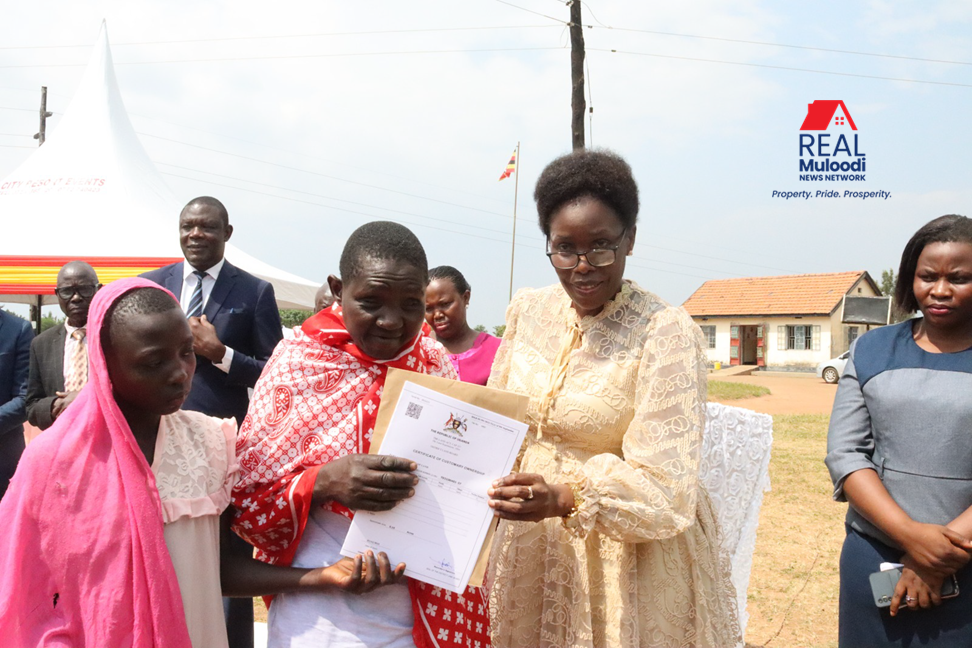UGANDA, Butaleja | Real Muloodi News | Uganda’s Minister for Lands, Housing and Urban Development, Judith Nabakooba, has recently urged residents of Butaleja, a district in the Busoga sub-region, to avoid land fragmentation.
The minister has stressed the need to conserve the environment and protect the land from being too small to be economically feasible for landowners.
Instead, Nabakooba has suggested that landowners hold the land together as a family and use it productively to grow their economic prospects.
During the giveaway of over 1,600 land titles to residents in Butaleja, Nabakooba also re-emphasised the need to preserve wetlands in Butaleja and throughout the Busoga Sub-region.
“The President while here in 2019, advised the families against subdividing their land noting that the act would lead to small sized land holdings that would be hard to economically make meaning to the land owners since the land will be too small,” she said.
She adds, “as a family hold the land together and use it productively to enrich yourselves. I strongly advise you not to subdivide your land because it won’t make any economic sense to you. The President has been strongly advising on this because he wants to see you economically grow.”
“We really need to protect the environment because it plays a huge role in making our lives complete,” she said.
To improve the land tenure system that benefits women, children and the youth, Uganda Community-Based Association for Women and Children’s Welfare (UCOBAC) has been partnering with the Ugandan government to provide customary land registration services to residents.
She added: “The Uganda Community Based Association for Women and Children’s Welfare (UCOBAC) and our partners have tried to sensitise the people on how to protect the sensitive ecosystem and environment. 40% of Butalejja is up made of wetlands. Government is also aware that parts of Busoga Sub-region is made of wetlands.”
About 1,624 residents in Butaleja have received land titles with the help of UCOBAC, which is implementing the project in partnership with the government.
In particular, UCOBAC has focused on three sub-counties, namely Mazimasa, Kachola, and Naweyo. The project is aimed at improving the land tenure system that benefits women, children and the youth.
Butaleja Chief Administrative Officer (CAO), Lawrence Ben Marley, revealed that land disputes are the most reported cases in the district, and some of the causes of land disputes in the district include polygamy, absentee landlords whose caretakers sell over their land, and the huge space taken up by the wetlands.
To mitigate the issues with customary land, the Lands, Housing and Urban Development Minister, Judith Nabakooba, has urged customary land owners in Butaleja District to embrace customary land registration.
During the handover of 300 out of 3,000 free certificates of customary land titles to registered land owners from the three sub-counties of Mazimasa, Kachonga, and Naweyo at Mazimasa Sub-county headquarters, the minister said the move is aimed at curtailing massive land grabbing in the district.
At least 80% of the land in Uganda is customarily owned, yet the holders lack proper documentation that can act as a point of reference in case of a dispute.
Nabakooba has informed locals that customary land titles offer the same legal tenure protection as the freehold tenure system, are cheaper, and are easier to process. This project will resolve and reduce land disputes in the district, ensuring that residents receive their land rights and certificates of customary land titles.
Nabakooba is hoping that locals will register their family land interests in order to resolve and reduce land disputes in the district.
The President has already encouraged those who have not yet registered to do so.
The Board chairperson of Uganda Community Based Organisation for Women and Children Welfare (UCOBAC), Ms Grace Angeline Chelimo, has noted that the organisation in partnership with the government, UN-Habitat, and Global Land Tools Network (GLTN), with support from the Netherland Enterprise and Development Agency (RVO), has been implementing a project titled “scaling up community-based land registration and land use planning on customary land in Butaleja, focusing on the three sub-counties.
During the demarcation and mapping process, 19 out of the 20 land disputes encountered were resolved, indicating the effectiveness of the project.
The UN-Habitat for Humanity, a GLTN-funded program, seeks to ensure tenure security for the vulnerable poor and special interest groups using fit-for-purpose tools.
READ MORE LIKE THIS:
Nabakooba Guides RDCs on Museveni Directive Halting Illegal Land Evictions
Hon. Judith Nabakooba Proposes No-Bail Law for Land Grabbers



